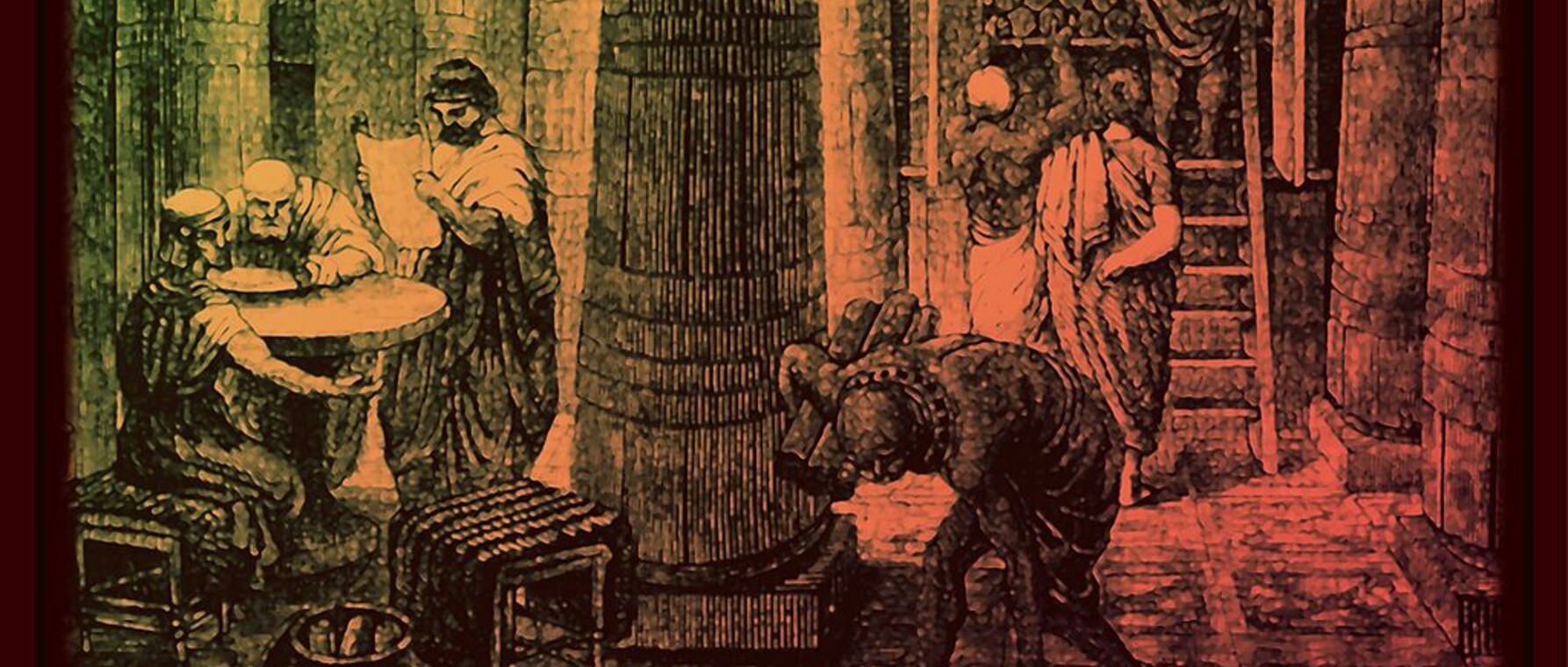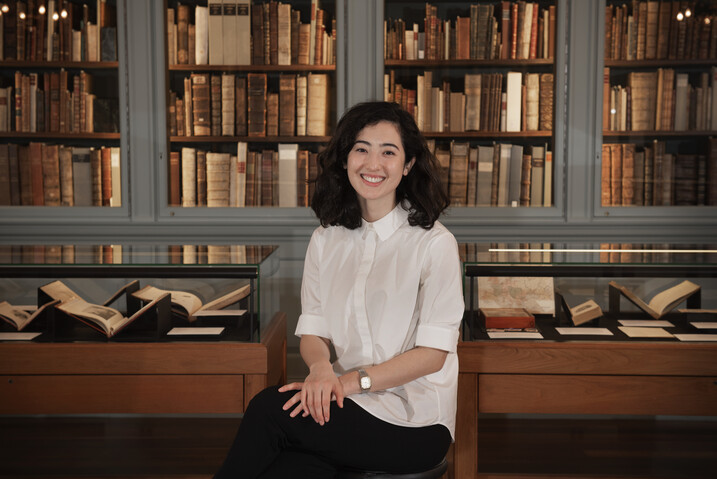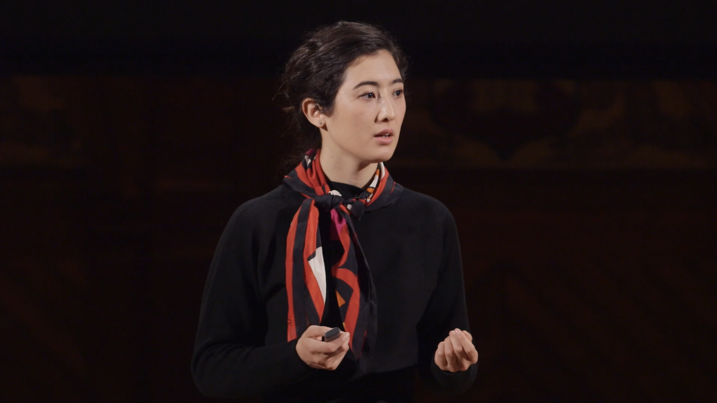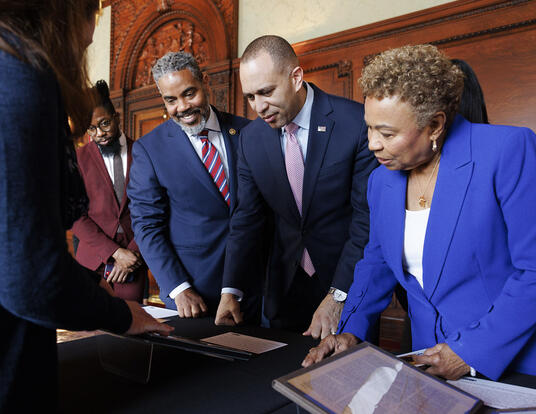Rethinking the History of Ancient Knowledge
Casting new light on the origins and mythology of Hellenistic libraries

Research at Risk: Since World War II, universities have worked with the federal government to create an innovation ecosystem that has yielded life-changing progress. Now much of that work may be halted as funding is withdrawn. Find out more about the threats to medical, engineering, and scientific research, as well as how Harvard is fighting to preserve this work—and the University's core values.
The history of ancient libraries has long centered on the Great Library of Alexandria. According to legend, the library was founded by King Ptolemy II of Egypt in the third century BC. Scholars today consider Alexandria to be the first major library of antiquity—one that has been a model of knowledge collection for over two millennia. But new research from classics scholar Alexandra Schultz seeks to recast our understanding of this wonder of the ancient world.
“We tend to think of Alexandria as this magnificent, universal library founded by a great king, the inspiration for all the libraries that come after it,” says Schultz, who received her PhD from Harvard’s Graduate School of Arts and Sciences (GSAS) in the fall of 2021. “My research interrogates this story that starts with a ‘great library’ that branches outward and looks at it as a patriarchal and imperial narrative of how knowledge works.”
In her doctoral dissertation, “Imagined Histories: Hellenistic Libraries and the Idea of Greece,” Schultz pushes back against the longstanding narrative of Hellenistic libraries as established, maintained, and used solely by wealthy, “great men.” In doing so, she hopes to shake up the way that scholars look at the history of knowledge.

A Contested Process
The first issue Schultz addresses in her research is the idea that the founding of the Library of Alexandria spurred a movement to build libraries throughout the classical world. In seeking out alternative explanations for the development of libraries, Schultz researched stone monuments inscribed with ancient documents that record how public libraries were created and maintained over decades.
“There was no great foundation moment,” she says. “Civic inscriptions show that the development of libraries was a much broader process that took place over time in different Greek cities throughout the Mediterranean. Adult, male, freeborn citizens would convene at assembly meetings, and they would decide to launch a campaign for the funding of a local library. They would send out a message soliciting donations and wealthy aristocrats were expected to donate money.” Citizens also elected public officials to oversee the library’s day-to-day operations, voted on library regulations, and publicly honored library donors.
Schultz says that previous scholars have tended to see activity around civic libraries as “king-like behavior,” focusing on the aristocrats who funded libraries—usually to amass prestige—while overlooking the role of the citizen assemblies that oversaw and maintained libraries.
“The aristocrats are the source of money, and they are honored publicly, but their behavior is significantly determined and constrained by what the assembly votes to do,” Schultz says. “You could think of it as the aristocrats manipulating the system and accruing honor from their donations. But you can also think about it as the citizen body manipulating the aristocrats and forcing them to use some of their wealth to fund public institutions. And it’s especially interesting that one of these public institutions is a library.”
Getting aristocrats to donate large amounts of money to fund local libraries was not always an easy endeavor, Schultz points out.
“It’s basically a way of trying to rectify a wealth imbalance,” she says. “But it never works out perfectly and no one is ever truly happy with the outcome. Aristocrats never want to give up their money. It’s a very contested process.”
There was no great foundation moment [for the ancient library]. Civic inscriptions show that the development of libraries was a much broader process that took place over time in different Greek cities throughout the Mediterranean.
—Alexandra Schultz, PhD ’21
Richard Thomas, George Martin Lane Professor of the Classics, served as a co-chair for Schultz’s dissertation committee. He says that, through its investigation of the role of the citizens, Schultz’s work advances the idea of the library as an extension of the city-state.
“Alex looked at the ways libraries in city-states like Athens project power, project complexity, project all sort of aspects of the society itself,” Thomas says. “In revisiting these myths of the library, Alex showed that there was a lot of mythology involved in our own understanding of what a library was.”
Myths of Conquest and Kings
Schultz also investigates the idea that knowledge circulated in the ancient world by means of kings and generals purchasing and plundering libraries. She says that scholars have long believed Greek and Roman imperial authors such as Strabo, Pliny the Elder, and Plutarch, who described libraries being violently transferred from one city to another, leaving a “hole in the knowledge” of the original city. Schultz’s research argues against this tidy way of imagining how knowledge traveled.
“This idea that you can transfer one collection to another place relies on the notion that books and libraries are unique,” she says. “But we know that books were typically copied out by hand, usually by enslaved workers. That's how books circulated. If there were only ever one copy, it would never have survived until the present day; we wouldn’t have any classical literature.”
If this point sounds academic, Thomas points out that the narrative of “neat transfer” is one that usually relies on violence as the mechanism—for example, in Roman stories of the conquest of Greece and the sacking of Greek libraries.
Alex’s work encourages us [to simply not] map our own libraries onto ancient ones…[It] will be important for others who want to pick up the story and take it down to any number of eras, including our own.
—Richard Thomas
“These were myths not only of conquering Greece but also of conquering its culture,” he says. “They’re about bringing Greek artifacts into the Roman world in a sort of psychological and intellectual conquest and acquisition. There are mythologies of great generals who are taking libraries with them, and there are some disturbing aspects of that.”
Carl H. Pforzheimer University Professor Ann Blair, one of Schultz’s dissertation readers, says that the recent graduate’s work shows how ancient Rome sought to glorify its status through stories of imperial violence and the conquest of library collections.

“The destruction of great libraries in conquered lands and the plundering of their contents to bring them to Rome were stories that reinforced the portrayal of Rome as a great, all-conquering empire, which absorbed the knowledge of other places for its own greater glory,” she says.
Despite these stories, Schultz says that conquest was not the primary way of expanding libraries. “Knowledge more often circulated through other means—gift-giving, sharing books, and copying originals, for example,” she says. “My work aims to decouple myths of imperial violence from the history of libraries.”
Schultz also calls into question the idea that the city of Alexandria was the intellectual successor to Athens. She looks skeptically at the famous story in which the Hellenistic king of Egypt tricks the Athenians into giving him original copies of famous Greek tragedies, which he then stores in the Library of Alexandria.
“A lot of people still think this story is true, but I argue that it’s too good to be true,” she says. “It encapsulates straightforwardly the idea that Athens was succeeded by Alexandria as a capital of knowledge production, and that by possessing books you can control knowledge and cultural capital.”
Thomas says that Schultz’s research will encourage readers to rethink the way they imagine libraries of the Hellenistic age before they draw comparisons between modern institutions and their ancient counterparts.
“Alex’s work encourages us [to simply not] map our own libraries onto ancient ones,” he says. “We might have thought of the Library of Alexandria being like Widener Library or Lamont Library. It is in a way, but the ancients were much less systematic; they did not have catalogs of books in the same way we do. This work will be important for others who want to pick up the story and take it down to any number of eras, including our own.”
Schultz says she hopes that ultimately her research can be part of a larger effort to write a fuller, more accurate story of intellectual history.
“Our notion of the perfect library has its roots in ideas that are patriarchal and racist,” she says. “My research is one small contribution toward this project of rethinking the history of knowledge.”
Photos by Stu Rosner and Tony Rinaldo
Get the Latest Updates
Join Our Newsletter
Subscribe to Colloquy Podcast
Simplecast





